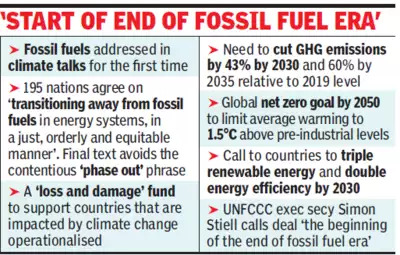Although the concept has been expressed for the first time in a CoP document, it has not yet had much of an influence. According to the agreement, energy systems must transition away from fossil fuels “in a just, orderly, and equitable manner”.
Each of these terms is open to various interpretations, and it’s anyone’s guess what will come out in the end. It advocates for a faster transition to renewable energy in this decade, with the goal of reaching net-zero emissions by 2050.
Triple the capacity of renewable energy sources and twice the rate of energy efficiency were targeted as part of the objective of keeping global warming to 1.5 degrees Celsius over pre-industrial levels. However, there are no specific steps in the agreement to accomplish this.

Source: The Times of India
A fair climate finance agreement for developing nations would be necessary to achieve this goal, but one has not yet come to pass. According to a UN estimate, developing nations—aside from China—would require at least $2.4 trillion annually to achieve this. In addition to the lack of funding, there were clear signs that the fossil fuel companies would not part with anything. Extraction of fossil fuels is increasing in the US and other oil and gas-producing nations.
Two days after CoP28 concluded, Sultan al Jaber, the president of the organization, who is recognized for having assisted in negotiating the deal, declared that his own business would keep making fossil fuel investments. The statement on fossil fuels is inconsistent with these reality. According to the UNEP, producing governments’ proposals will result in 69% greater output than even a less ambitious 2 degrees Celsius warming target.
Source: Down To Earth
Regarding adaptive strategies, there was again no satisfactory conclusion reached. The Global Goal on Adaptation did not include a commitment; it merely aimed to address the finance gap. It was unclear how the wealthy nations would be held accountable for their actions and how the adaptation funding would be increased.
The next CoP meeting should focus on increasing rich countries’ climate finance, as financing was not given enough attention in the conclusion text. Although certain cutting-edge technologies have been developed to help replace fossil fuels, they will not be available to poor and emerging nations. The conclusion of the summit is expected to mark the beginning of the end of the fossil period, but the CoP28 document does not guarantee that this will occur in the time frame anticipated.
What do you think about this? Comment below.

